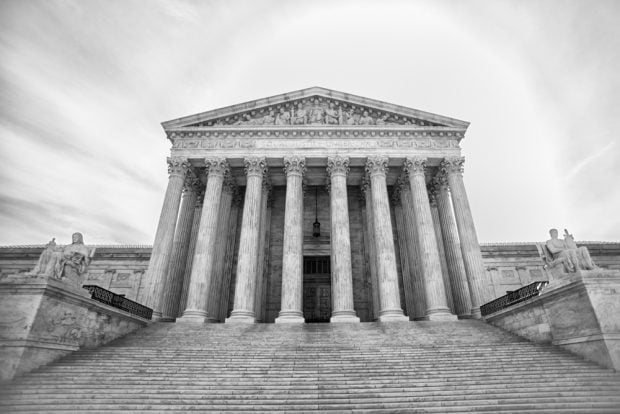 U.S. Supreme Court. (Source: Shutterstock)
U.S. Supreme Court. (Source: Shutterstock)
CUNA and NAFCU have been longtime and frequent critics of actions of the CFPB, which was set up by Congress in 2010 to prevent some of the abuses that prevailed in the run-up to the Great Recession.
On Monday, the Supreme Court agreed to hear a case that might allow it to dismantle the agency. Now, some at NAFCU are concerned that a broad ruling might create "chaos" by undermining the legitimacy of a host of rules that credit unions use to close mortgages and other loans.
Recommended For You
The case was brought in 2017 by the Community Financial Services Association of America, the payday lending industry's lobbying group. The case made its way to the U.S. Court of Appeals for the Fifth Circuit in New Orleans, which ruled last October that the CFPB operates outside of what it considers a constitutional imperative that agencies be funded from direct appropriations by Congress.
The Supreme Court's announcement that it would hear the case arrived just a few hours before CUNA President/CEO Jim Nussle shared the stage with CFPB director Rohit Chopra at CUNA's annual Governmental Affairs Conference (GAC) in Washington, D.C.
Chopra said he was pleased the Supreme Court would be reviewing the 5th Circuit's decision.
"At the end of the day, we want there to be certainty about rules that were written 10 years ago, safe harbors put into place," Chopra said. "We don't want a situation where financial institutions all over the country are getting sued because of a lack of clarity of actions. I'm hopeful this is the next step to create that clarity, and we'll let the process move forward."
Nussle responded that "it's been clear for some time that there are serious flaws with the CFPB's current structure and we have long supported congressional action to restore accountability and oversight. The Supreme Court agreeing to hear the case on constitutionality highlights the urgency of this issue."
CUNA has long supported placing the CFPB under the traditional appropriations process. NAFCU has long held that credit unions should be exempt from CFPB jurisdiction and instead be regulated solely by NCUA.
The Supreme Court expects to hear oral arguments in October, with a ruling possible in the spring of 2024.
There are two levels of concern for credit union trade groups. One is the effect on the CFPB itself. The other is the potential of the court opening the door to challenges to other independent federal agencies, like the NCUA.
In a NAFCU call with media on Thursday, Ann Petros, vice president of regulatory affairs, said NAFCU opposes a decision "that would upend the CFPB and could put the consumer financial services industry into chaos."
 Ann Petros
Ann Petros "What we don't want is the CFPB dismantled," Petros said. "It should continue to operate."
If the CFPB is deemed to be an unconstitutional creature, the actions it spawned might also be considered illegitimate. Petros said this could raise questions of the validity of a host of current lending rules, such as those governing mortgage originations or car lending.
Whether good or bad, credit unions have devoted considerable time and money building systems to comply with those rules.
"There would be a question if people could close loans," Greg Mesack, NAFCU's SVP of government affairs, said. "It could have a devastating impact on people buying homes, buying cars."
 Greg Mesack
Greg Mesack On the call, Petros closed by saying NCUA, like the CFPB, is similarly structured as an independent agency outside of the normal appropriations process. "We are very cognizant of that."
The appeals court last October recognized that the FDIC, NCUA and a few other federal agencies are exempt from direct appropriations from Congress, but said the CFPB uniquely qualified for judicial intervention because it had "double insulation" from congressional oversight.
The judges said that the CFPB is not only exempt from direct appropriation, but Congress "also ceded indirect control by providing that the bureau's self-determined funding be drawn from a source (the Federal Reserve) that is itself outside the appropriations process — a double insulation from Congress's purse strings that is 'unprecedented' across the government. Wherever the line between a constitutionally and unconstitutionally funded agency may be, this unprecedented arrangement crosses it."
The ruling's preamble touched on the words of James Madison, Thomas Jefferson and George Mason.
While the founding fathers are known to have worn powdered wigs, they are not known to have used "double insulation" as divider between federal agencies that can pass constitutional muster and those that cannot.
Likewise, while "double insulation" might have been a useful rubric of the 5th Circuit Court of Appeals, there is no guarantee the Supreme Court will use it to protect other independent agencies, including the NCUA, which administers financial institutions that operate outside the for-profit universe and are exempt from paying income taxes.
Nonetheless, NAFCU and CUNA largely rest their hopes of preserving the NCUA's current independence on the strength of the "double insulation" concept.
Jason Stverak, CUNA's deputy chief advocacy officer for government affairs, said in an email to CU Times that the NCUA is also different because it is funded by credit unions.
 Jason Stverak
Jason Stverak "I would also note the agency holds statutorily-required public budget hearings annually and budgetary decisions are openly discussed and debated among its multi-member statutorily-bipartisan Board. Whereas, the CFPB is subject to none of those checks," he wrote. "We strongly support the NCUA's status as an independent agency and will continue to do so."
The Center for Responsible Lending and other consumer groups filed briefs supporting the CFPB against the suit.
On Monday, Nadine Chabrier, a lawyer for the Center for Responsible Lending, said in a news release that the Supreme Court would be reviewing a lawsuit that poses "an existential threat" to the CFPB and similarly funded agencies.
 Nadine Chabrier
Nadine Chabrier "If the Supreme Court accepts this deeply flawed argument against CFPB funding, it would set a dangerous precedent that would be used to challenge agencies with legally indistinguishable funding, including the Federal Reserve, FDIC, Medicare and Social Security," Chabrier said.
The Center for Responsible Lending said Congress has long authorized funding streams for government agencies separate from an annual congressional appropriations process. The CFPB's funding was authorized by the Dodd-Frank Wall Street Reform and Consumer Protection Act of 2010.
"The Constitution requires that funding for government activities be authorized by a law passed by Congress, but the Constitution does not prescribe a method that the 5th Circuit inaccurately portrays as mandatory," the group said.
© Touchpoint Markets, All Rights Reserved. Request academic re-use from www.copyright.com. All other uses, submit a request to [email protected]. For more inforrmation visit Asset & Logo Licensing.







